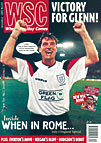 Phil Dorward looks at the impact of Ivan Golac, one of the first foreigners to manage a football club on these shores
Phil Dorward looks at the impact of Ivan Golac, one of the first foreigners to manage a football club on these shores
When Ivan Golac was sacked as manager of Dundee United in March 1995 he returned to his native Yugoslavia to buy a chocolate factory. It was totally in keeping with the events of the previous two years: Golac realised the dream of winning the Scottish Cup, United’s first victory in seven attempts, before dispensing with tactics and getting United relegated the next season. In essence, Golac was a pseudo European manager, chocolate being the only continental thing he ever produced.
Golac arrived as United manager as Scotland were heading out of qualifying for the 1994 World Cup. The failings of Scottish football led many to believe that the domestic game could benefit from the insight of European managers. Golac seemed to have a fair pedigree, winning the Yugoslavian Cup 6-1 in his first season as manager of Partizan Belgrade and running Liam Brady very close for the vacant Celtic manager’s job in 1992. Via Torquay, in the summer of 1993 Golac became the first new Dundee United manager in 22 years, following the retirement of Jim McLean, who stayed on as chairman.
Golac could not have been more different than McLean: the latter was a dour Presbyterian and a master of the tactics, while the former was a laid back hippy who sauntered in extolling the virtues of walking through the forests and smelling the flowers. Golac, quite simply, had a different agenda from the rest of the footballing world. Before the 1994 Cup Final he said this: “You know, my philosophy in life is very simple: whatever you do, enjoy it. When you go for a walk, listen to music, chat with a friend, just enjoy it.” Compare this to McLean who once withheld his players win bonuses after a 6-0 win because the team was not entertaining enough.
The 1993-94 Scottish Cup run proved to be the perfect foil for Golac’s verbosity. Powerfully dispensing with Arbroath, Motherwell, Airdrie and Aberdeen, United met Rangers at Hampden, a ground they had not won the cup on in six attempts with McLean since 1974. But Golac was such a big-time man and instilled such belief in the players and supporters that both went across to Glasgow bubbling with hope. When Craig Brewster’s 46th minute strike won United the Cup it was as if all the pain that had gone before was annulled. May 31st 1994 will remain for many United supporters the greatest day of their lives and they have Golac to thank for that.
However, the dream swiftly melted. On the opening day of the next season United were thumped 5-0 by Hibs and went out of the first round of the Cup-Winners’ Cup to unheard of Slovak side Tatran Presov. It was only at that juncture that many fans and the media realised that United’s 1993-94 season had hinged on two results against Rangers, the cup victory and the 3-0 December 1993 defeat of the champions at Ibrox.
Ivan Golac, it soon transpired, was ‘European’ by birthright only and none of the supposed benefits of having a continental manager were coming the way of United. There were no new diets, ideas or training methods. McLean’s afternoon training sessions were abandoned and morning work-outs were often lax. As a result United soon became the unfittest side in the league.
Still the hyperbole flowed: Golac claimed that £250,000 buy Jerron Nixon would be sold for £10 million; Nixon was last seen earlier on this year at trial at Watford. Christian Dailly, now with Derby, was dubbed “the new Franz Beckenbauer” by a manager who strangely did not know what Dailly’s best position was. Despite the many talented individuals at his disposal, Golac’s team were considerably weaker than the sum of its parts.
Of course there was always the accusation by Golac that McLean wouldn’t give him the necessary funds for transfers, and it will always be the great unanswerable as to how much control McLean had over Golac. But then other than Gordan Petric, now with Rangers, every one of Golac’s buys, and especially the abysmal Croat striker Dragutin Ristic, proved to be duds; small wonder McLean kept the money locked away. The only truth was that McLean said that he would judge his manager on his ability to craft a winning side; United won nine out of thirty-six that miserable season.
Golac left United with a handful of games to go and it was actually new manager Billy Kirkwood who took the side down to the First Division, but it was Golac’s legacy. With divine irony, however, Kirkwood, who although a highly regarded coach, proved to be just as inept a manager as Golac; this time it was McLean who made the appointment.
Jim, however, was to have the last laugh in this sorry tale. In February of this year Ivan Golac went on to manage his first club since United, Akranes of Iceland, who had just won their fifth championship in a row. By the end of July he was out of a job, along with his first signing, who he dubbed the “world’s number one striker”, Dragutin Ristic. A team delegation demanded the board sack him after they finished third in the league and went out of the cup in the quarter-finals.
Just as post-Bosman we have seen that some continental footballers are actually as crap as our players, so Ivan Golac exploded the myth that European managers necessarily know more than that their British counterparts.
From WSC 130 December 1997. What was happening this month